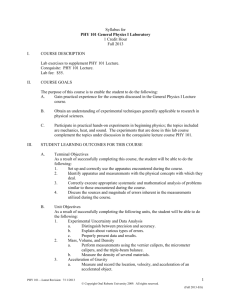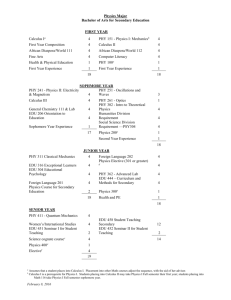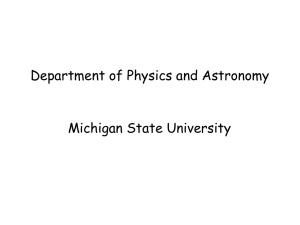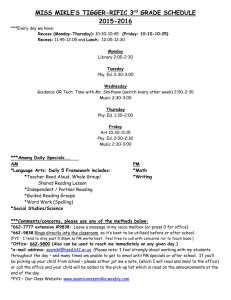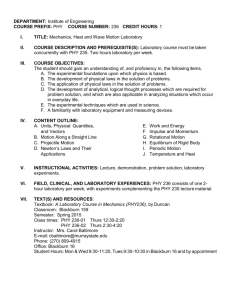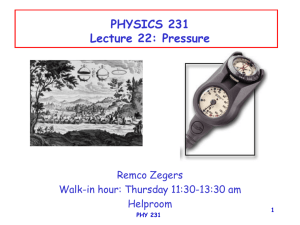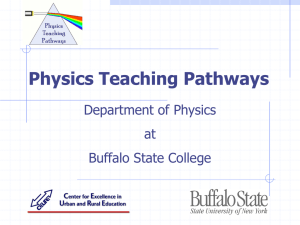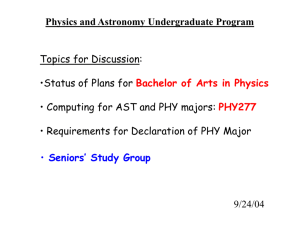PHY 1048L (Sect. 1250)-Syllabus TR 1
advertisement
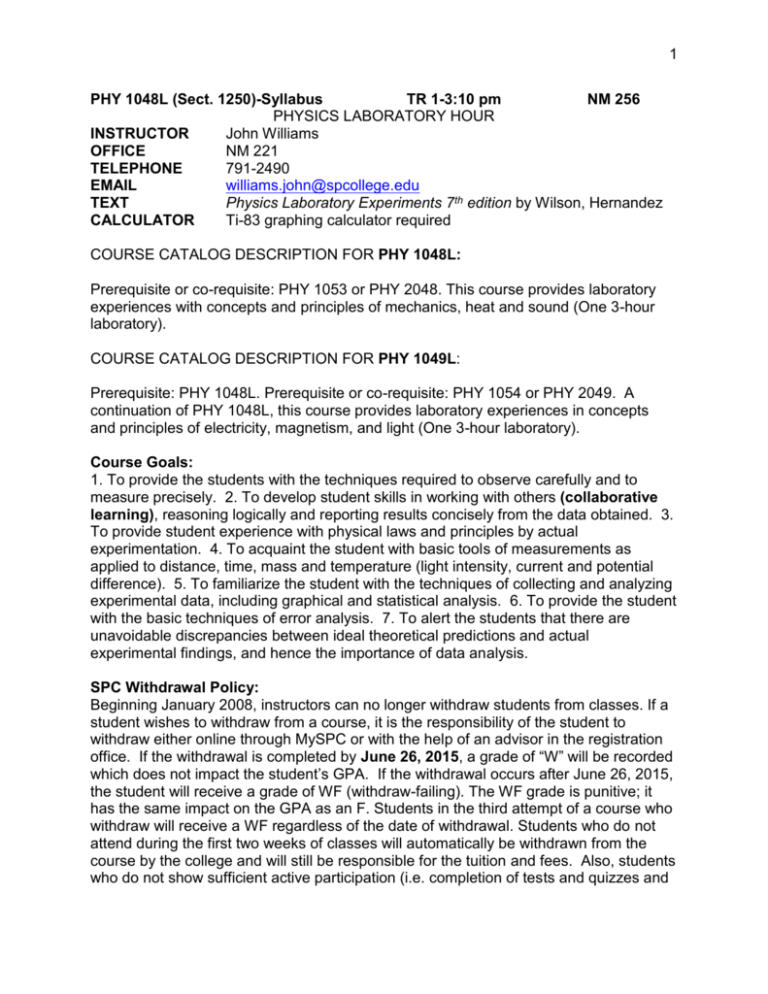
1 PHY 1048L (Sect. 1250)-Syllabus TR 1-3:10 pm NM 256 PHYSICS LABORATORY HOUR INSTRUCTOR John Williams OFFICE NM 221 TELEPHONE 791-2490 EMAIL williams.john@spcollege.edu TEXT Physics Laboratory Experiments 7th edition by Wilson, Hernandez CALCULATOR Ti-83 graphing calculator required COURSE CATALOG DESCRIPTION FOR PHY 1048L: Prerequisite or co-requisite: PHY 1053 or PHY 2048. This course provides laboratory experiences with concepts and principles of mechanics, heat and sound (One 3-hour laboratory). COURSE CATALOG DESCRIPTION FOR PHY 1049L: Prerequisite: PHY 1048L. Prerequisite or co-requisite: PHY 1054 or PHY 2049. A continuation of PHY 1048L, this course provides laboratory experiences in concepts and principles of electricity, magnetism, and light (One 3-hour laboratory). Course Goals: 1. To provide the students with the techniques required to observe carefully and to measure precisely. 2. To develop student skills in working with others (collaborative learning), reasoning logically and reporting results concisely from the data obtained. 3. To provide student experience with physical laws and principles by actual experimentation. 4. To acquaint the student with basic tools of measurements as applied to distance, time, mass and temperature (light intensity, current and potential difference). 5. To familiarize the student with the techniques of collecting and analyzing experimental data, including graphical and statistical analysis. 6. To provide the student with the basic techniques of error analysis. 7. To alert the students that there are unavoidable discrepancies between ideal theoretical predictions and actual experimental findings, and hence the importance of data analysis. SPC Withdrawal Policy: Beginning January 2008, instructors can no longer withdraw students from classes. If a student wishes to withdraw from a course, it is the responsibility of the student to withdraw either online through MySPC or with the help of an advisor in the registration office. If the withdrawal is completed by June 26, 2015, a grade of “W” will be recorded which does not impact the student’s GPA. If the withdrawal occurs after June 26, 2015, the student will receive a grade of WF (withdraw-failing). The WF grade is punitive; it has the same impact on the GPA as an F. Students in the third attempt of a course who withdraw will receive a WF regardless of the date of withdrawal. Students who do not attend during the first two weeks of classes will automatically be withdrawn from the course by the college and will still be responsible for the tuition and fees. Also, students who do not show sufficient active participation (i.e. completion of tests and quizzes and 2 regular attendance) in the course by June 26, 2015, will be administratively withdrawn by the college and receive a WF. Students who withdraw from all classes may be required to repay some or all of the financial aid received for the term. Should you consider totally withdrawing from all classes before June 26, 2015 (for the summer session) it is important that you consult the Scholarships & Student Financial Assistance office on your home campus to understand your options and the consequences of total withdrawal. Attendance Policy: Students are required to attend class regularly and on time. Attendance will be recorded at the start of each period. Late arriving students are responsible for signing in at the end of the class to avoid being counted absent. Except in an emergency, a student who needs to leave early should notify the instructor at the beginning of the period. When absent, it is the student’s responsibility to learn what was missed (assignments, handouts, due dates, etc). Students missing class are strongly encouraged to contact the instructor promptly to avoid an unexcused absence. Documentation will be required in order to excuse an absence. Laboratory and Clean-up Responsibilities: Students are expected to clean up equipment and return it to the original state in which it was found. Text and Supplies: The laboratory manual is required. The student is required to supply his/her own drawing equipment such as protractor, compass, etc. as well as required graph paper. Grading Policy: Your final grade will be determined in the following manner: 80% - Lab Reports 20% - Final Exam There will be no makeups and lowest lab score will be dropped before final grades are averaged. Maximum lab score – 10 points. GRADING SCALE: A = 90 – 100 % B = 80 – 89 % C = 70 – 79 % D = 60 – 69 % F = Below 60 % Procedure for Lab Reports: One clear word processor version lab report is to be turned in per group. Everyone in the group will receive the same grade. These reports will contain the following information: 1. Cover sheet: Names in group, Contribution of each member, Title of report, Date 2. Objective: A short statement of what the experiment expects to achieve 3 3. Apparatus: Describe or list the apparatus. Include a diagram where appropriate. 4. Procedure: An account of the way in which the experiment was carried out. 5. Results: Data recorded during the experiment. (Data Tables) (Note: Data should be collected on a worksheet, not on the data table in the manual.) All calculations should be “roughed out” before the student leaves the laboratory. This worksheet should be the last page of the report. It is in addition to the formal data tables.) 6. Discussion: This is a very important part of the experiment. It indicates your understanding of the experiment, your ability to communicate in writing, and your ability to think constructively. It is the part of the report that is original to you and in general will take the most time. The following should be included as a part of the summary: a. List the major numerical results of the experiment. (including numerical estimates of error if a standard is available) b. List the chief source(s) of errors and what steps if any were taken to eliminate these. Give numerical estimates of these when possible. At a minimum, include size of possible instrumental errors. c. Include a summary of any graphs and their interpretation. d. .Sample calculations: a sample of all equations used with collected data 7. Answers to questions: 8. Conclusion: What can you deduce from the results? All analyses and data are to be typed. Graphs are to be created with software program (i.e. Excel). These reports are due the following class period. Additional hints on lab reports: Use past tense. Avoid personal pronouns in technical writing - (i.e. I, we, you, etc.). Label each section of the report...Theory, Procedure, Results, etc. All analyses and data are to be typed (12 pt. font, double spaced). Graphs are to be created with software program. These reports are due the following lab meeting. DATE Assignment May 19 May 21 Experimental Uncertainty Measurements; Density May 26 May 28 The Force Table The Force Table June 2 The Atwood Machine 4 June 4 The Atwood Machine June 9 June 11 The Simple Pendulum Elastic Collisions June 16 June 18 Ballistic Pendulum Ballistic Pendulum June 23 June 25 Centripetal Force Friction June 30 July 1 Inelastic Collisions Torques July 7 July 9 Simple Harmonic Motion (SHM) Sound July 14 July 16 Coefficient of Thermal Linear Expansion Wrap up; Review and Lab #14 Due July 21 Lab Final Exam SYLLABUS ADDENDUM http://www.spcollege.edu/central/asa/addendum.htm


